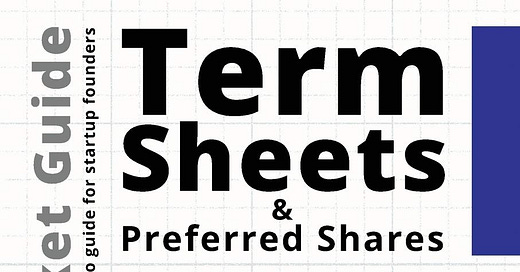Who Owns What? Anti-Dilution and Board Seats Explained
This Friday -> "Founder's Pocket Guide: Term Sheets and Preferred Shares" by Stephen R. Poland [2 min reading]
Hey, it’s Fede!
In the past few weeks, we've talked about many useful insights for founders looking to raise funds for their startups.
Unfortunately, even if we keep it simple, covering all the basics would be very complicated. That’s why this week, I’m recommending this book to you.
"Founder's Pocket Guide: Term Sheets and Preferred Shares" by Stephen R. Poland. Less than one hundred pages, offering a complete overview of all the basics you need to know when launching your startup. Highly recommended!
These are the chapters of the book that I found most interesting:
Anti-dilution clauses protect investors from losing ownership percentage if the company raises funds in a down round (at a lower valuation than before).
As you can imagine, in a down round, early investors' percentage ownership is diluted by the new investors, and the value of their shares decreases. This is a problem because investors, founders, and early shareholders end up with a smaller portion of the company, reducing both their control and potential returns. There are two main types of anti-dilution clauses to protect mainly the investors:
Full Ratchet: Adjusts the investor’s share price to match the new, lower valuation, keeping their ownership intact (the share %) but heavily diluting founders. It’s super founder-unfriendly.
Weighted Average: Recalculates the share price for both investors and founders using a blended average, which is better for the founders.
“Board Representation” is about who gets a seat on the board of directors (BOD) which is the group that meets to make important decisions for the startup, like setting goals, approving budgets, and hiring top executives.
The board of directors is generally composed of the following members:
Founder Representation: Founders usually aim to keep a majority of board seats so they can take the big decisions. Sometimes they’ll bring on independent board members who share their vision to help ensure the board stays aligned with the company’s goals.
Investor Representation: Investors often seek board seats that reflect their stake in the company, giving them some influence over the startup. In some cases, they may choose to sign a Power of Attorney (POA), allowing a delegate to attend on their behalf and vote according to their instructions or the decisions of the board of directors. Additionally, investors may request observer roles instead of voting seats, allowing them to stay informed without direct decision-making authority.
Independent Representation: Independent directors can add balance, bringing a neutral voice that aligns founder and investor interests. They are often experts that provide an objective view, helping the board focus on the long-term picture and avoiding conflicts.
See you next Friday,
Federico Lorenzon







